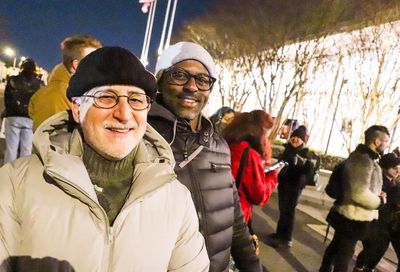Simmering divide over ENDA’s broad religious exemption set to boil

Congress has returned to Washington after its month-long summer recess, and as a historic Senate vote draws nearer on the Employment Non-Discrimination Act, lingering divisions over the legislation’s religious exemption could set the stage for a battle between advocates in the months ahead.
During a panel discussion in New York City last week hosted by Freedom to Work as the first part of its “ENDA Situation Room” series, a bipartisan panel met to “plot a path forward” for the bill, which has languished in Congress for decades. But that path forward rapidly became mired in a debate over whether ENDA’s religious exemption as written would open the door to LGBT discrimination in places far beyond churches and synagogues, and whether narrowing ENDA’s religious exemption would cause shaky Republican support to collapse entirely.
According to Tico Almeida, president of Freedom to Work, the religious exemption as written has proven popular among Republicans who might not otherwise support ENDA and is the “sweet spot of both law and politics.”
“I think it is the best of all of the options because it provides clarity,” Almeida said. “It creates a 100 percent match with the entities that are exempt from Title VII religious provisions [of the Civil Rights Act]. So we have 40 years of case law, we have 40 years of precedent, we have 40 years of experience that will let religious employers know whether they are covered by ENDA.”
Almeida bears a special relationship with the current religious exemption: He helped write it. As chief counsel for ENDA in the House of Representatives from 2007 to 2010, Almeida was one of two individuals who helped craft its current language. The bill states that ENDA “shall not apply to a corporation, association, educational institution or institution of learning, or society that is exempt from the religious discrimination provisions of title VII of the Civil Rights Act of 1964,” which prohibits workplace discrimination on the basis of race, color, religion, sex or national origin.
But while Almeida has fervently defended the language, several prominent organizations have said it’s just not good enough.
The American Civil Liberties Union (ACLU), Lambda Legal, the National Center for Lesbian Rights (NCLR) and the Transgender Law Center released a joint statement in April “expressing very grave concerns with the religious exemption in ENDA.”
“It could provide religiously affiliated organizations – far beyond houses of worship – with a blank check to engage in employment discrimination against LGBT people,” the statement continued. “It gives a stamp of legitimacy to LGBT discrimination that our civil rights laws have never given to discrimination based on an individual’s race, sex, national origin, age, or disability. This sweeping, unprecedented exemption undermines the core goal of ENDA by leaving too many jobs, and LGBT workers, outside the scope of its protections.”
They argue, for example, that the religious exemption as written could allow for a Catholic hospital that employs people of other faiths to still be able to fire or refuse to hire an LGBT person.
Even at last week’s “ENDA Situation Room,” Evan Wolfson of Freedom to Marry — the organization on which Almeida has modeled Freedom to Work – said he had “grave concerns” with the religious exemption.
Critics of the religious exemption have continued to walk a fine line between applauding ENDA’s advancement with bipartisan support, while also insisting the provision must be addressed. But as Almeida and groups lobbying Republican members of Congress insist, narrowing the religious exemption would sacrifice Republican support and eliminate any possibility of ENDA’s passage.
Perhaps nowhere is this more apparent than in the case of Utah’s Sen. Orrin Hatch, who shocked many when he became one of three Republicans on the Senate Health, Education, Labor & Pensions Committee to vote in favor of ENDA. Hatch wasn’t at the committee markup to explain his vote, but has since said it was directly influenced by ENDA’s current religious exemption.
“Orrin Hatch voted for ENDA in committee specifically because of the exemption. He has said publicly if it changes even a little bit it switches back to no,” Almeida stated.
And that will no doubt be the case for the handful of Republican senators LGBT advocates are lobbying who remain crucial to reaching 60 votes in the Senate. According to Gregory T. Angelo, executive director of Log Cabin Republicans, their GOP targets for “yes” votes on ENDA include Sens. Rob Portman (Ohio), Jeff Flake (Ariz.), Dean Heller (Nev.), Pat Toomey (Pa.) and Kelly Ayotte (N.H.).
“Making sure those protections are there is something that is paramount to [Senate Republicans],” Angelo said during last week’s panel.
Regardless of the debate, the religious exemption as written has a track record of success. When it was adopted with a 402-25 vote in 2007 as an amendment in the House proposed by Rep. George Miller (D-Calif.), it received the backing of not only Democrats like Nancy Pelosi, Barney Frank and Tammy Baldwin, but Republicans like John Boehner, Eric Cantor and Paul Ryan.
Despite the reality that Republican support is necessary for ENDA’s passage, and that Republicans on Capitol Hill have attached themselves to ENDA’s religious exemption with Hatch leading the charge, a fight is brewing for when ENDA is taken up by the full Senate this fall.
“While the focus now, rightly so, is on moving the ball forward legislatively, ENDA’s sponsors are likely to once again face the question of whether to include a narrower, more appropriately tailored religious exemption,” said Ian Thompson, a legislative representative for the ACLU. “We’re laying the foundation now to help make that happen.”
From which senator such an attempt may come remains unclear. Sen. Tammy Baldwin (D-Wis.), the chamber’s first out member and a co-sponsor of ENDA, said in an interview with Michelangelo Signorile that she too shares concerns voiced about the religious exemption.
“But it’s very clear when the coauthors and others were coming together in preparation for introducing the bill, that it would have a lot fewer cosponsors if that language wasn’t in. Legislating is about compromise. And it’s one of the compromises that were made,” Baldwin said. “It’s a starting point in the U.S. Senate.”
Thompson said the ACLU remains committed to seeing the exemption narrowed while moving forward strategically positioned for success.
“The immediate goal is to make more members of Congress, and the broader LGBT community, aware of the problems with ENDA’s current exemption,” Thompson said. “Doing that work now and into next year positions us well for 2015 and the start of the 114th Congress.”
[Photo credit: Heather Reed/Office of John Boehner.]
Support Metro Weekly’s Journalism
These are challenging times for news organizations. And yet it’s crucial we stay active and provide vital resources and information to both our local readers and the world. So won’t you please take a moment and consider supporting Metro Weekly with a membership? For as little as $5 a month, you can help ensure Metro Weekly magazine and MetroWeekly.com remain free, viable resources as we provide the best, most diverse, culturally-resonant LGBTQ coverage in both the D.C. region and around the world. Memberships come with exclusive perks and discounts, your own personal digital delivery of each week’s magazine (and an archive), access to our Member's Lounge when it launches this fall, and exclusive members-only items like Metro Weekly Membership Mugs and Tote Bags! Check out all our membership levels here and please join us today!
























